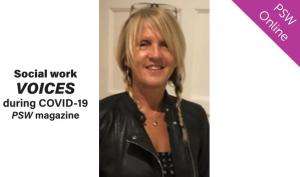Getting COVID-19 hits you mentally as well as physically

Professional Social Work magazine - 21 May, 2020. Share your COVID-19 experiences here.
The physical impact of coronavirus gets a lot of attention. Having had it, I think it is important to share the emotional effects too.
Getting diagnosed with COVID-19 was a shock. As a social worker and practising AMHP I’d taken all precautions to keep myself and others safe and always wore PPE when out on duty.
My symptoms had started with a slight cough. Twenty fours later I started suffering flu like symptoms. I began getting aches and pains. My eyes felt like they were on fire, I started feeling dizzy and more exhausted. Then I began to struggle to breathe properly. I started to get very frightened.
I’d seen plenty on social media about people struggling to breathe, then being admitted to hospital and dying soon after. I remember lying in my bed scared, wondering if my breathing would return to normal.
I was drenched in sweat and full of anxiety. I couldn’t stop visualising myself in a hospital bed, attached to equipment to get me enough oxygen. I truly thought I was going to die. I’d worked myself up into such a state that irrational thoughts were flooding my logical senses.
I could hear the sound of my own thoughts asking to spare me, as who would care for my dogs, without me they would not survive.
During this whole experience I’ve found myself going through different stages of processing what was going on. There was denial – this cannot be happening to me I took precautions. Then it was anger – why me, what have I done to get this? Then, later, there was a peace of mind. I accepted I would never know how or why I got the virus.
Eventually I physically started to recover but I also placed a lot of attention on allowing my mind to heal. After my symptoms started I had to stop work for obvious reasons but I made sure I did things that relaxed me and gave me a sense of hope.
It is important to stay positive, give your friends and colleagues a call. It really helped me to hear from my manager and colleagues through messages, calls or emails. It made feel I wasn’t alone and this wasn’t my fault. That was important because I initially blamed myself for getting the virus.
One other thing to say is that going for the test was hard mentally too. I was going into the unknown and had no clue what to expect. At points I was shaking as I was so nervous.
I arranged my test by calling NHS 111 and going on to the government website to book a next day appointment. My nearest test centre was Edgbaston cricket ground. When I arrived I was seen straight away.
The first step was to show my ID and a barcode I’d been sent via text and email. After one more ID check I drove a few yards to another checkpoint where one of the workers held a board up with their mobile number on it. I rang it and they gave my instructions on how to use the swab. They told me to wind down my window down a fraction, just enough for the package with the swabs to be dropped onto the passenger seat.
I then drove on a few yards, parked up and did the test. You swab the back of your throat for 10 seconds and using the same swab both nostrils for 10 seconds. At the next stop I sealed the bag, put in in a bin and away I went. Within 10 minutes I was on my way home.
I wanted to share this with others who might need to go for a test at some point as I had no one who I could ask about the process and this heightened my anxiety.
My overall message to anyone who finds themselves developing COVID-19 symptoms or contracting the virus is please be kind to yourself. In the world of mental health we often talk about the importance of talking through our problems and worries. It is important we practice what we preach and open up and be honest with ourselves. It’s okay to not be okay.
Do you have experiences, thoughts or feelings of social work during the COVID-19 pandemic you would like to share with Professional Social Work magazine? Click here to find out how.
